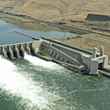The Hon. Rob Bishop, chair of the House Natural Resources Committee, has balls. Huge, enormous balls. Bishop hates public lands. Your lands. And wants to be sure you to know it.
If you’re not already familiar with Bishop, he’s part-and-parcel to the messianic crowd hailing from Utah that is working tirelessly to seize publicly owned lands from the federal government and turn them over to oil and gas drillers. Bishop and his cronies always take care to couch their thinly veiled extraction efforts as goals that seek “better management” at the state level, while disregarding entirely that their states don’t have even a small fraction of the funds required to manage the lands they seek to seize.
Earlier this year, as part of his witch hunt, Bishop saw to the expiration of the Land and Water Conservation Fund (LWCF), one of the most beloved and successful conservation programs in history. Most recently, Bishop has introduced the PARC Act, which—while it offers some glimmer of hope in the fact that it would reauthorize the now-dead LWCF for a measly 7 years—seeks to reform what Bishop calls the “failures of the Land and Water Conservation Fund.” In reality, Bishop’s proposal does little to reform the not-in-need-of-reform LWCF, and instead fuels his crusade against public lands and offers huge breaks to the oil and gas industries.
As noted, the LWCF is virtually universally beloved. As Ty Hansen wrote in a recent piece, “The Land and Water Conservation Fund—which is funded almost entirely from royalties charged on offshore oil and gas leases which are then invested in onshore conservation projects—is right up there with the Endangered Species Act, the Clean Air Act and the Clean Water Act as one of the best accomplishments in the history of the United States Congress. It literally costs the American taxpayer nothing, but contributes billions of dollars every year in revenue to local communities that benefit from LWCF projects. Communities and counties in all 50 states have been the direct beneficiaries of LWCF funding since it was put into place half a century ago.”
Yet, according to Bishop, the LWCF is a failure, one in dire need of reform. So what exactly does Bishop’s reform look like?
Blocking funding for federal land acquisition
More Like This
The PARC Act reduces the amount of LWCF funding that can be used by the government to acquire federal lands to 3.5 percent, and blocks most potential land acquisitions in the West. Bishop would have you believe that the LWCF has been stealing backyards from your grandparents and neighbors and locking them away behind fence and gate. In truth, according to agencies like the Bureau of Land Management (BLM), funds from the LWCF allowed them “to make some significant accomplishments in acquiring land for natural resource benefits, including open space, wildlife habitat and recreation.
This includes the Headwaters Forest Reserve—an old-growth coastal redwood grove located in northern California near Humboldt Bay, one vital to North Coast steelhead and coho salmon. It was purchased cooperatively with funds from the LWCF and the state of California, in order to protect its ancient ecosystem. It sits atop the Eel River drainage, one of the best remaining steelhead and salmon rivers in the Golden State for anglers.

Also acquired with LWCF funding was the Upper Snake/South Fork Snake River Special Recreation Management Area, in Idaho—43,000 acres that contain the largest population of the critically-endangered Yellowstone cutthroat trout outside of Yellowstone National Park and also provides essential habitat to moose and deer and over 126 species of birds. The area’s myriad recreation opportunities bring it over 300,000 recreational visits of year from the individuals that own its land—you and me; the American public.
The act also limits lands that can be acquired with LWCF funds to those that currently abut existing federally owned lands on at least 75 percent of their borders, and further limits to 15 percent acquisitions west of the 100th meridian (which runs through the Dakotas on down and through Oklahoma and not-so-coincidentally creates a region that includes Bishop’s home state of Utah).
Handouts to the oil and gas industry
Perhaps most egregiously, the PARC Act would reserve no less than 20 percent of the LWCF’s annual budget ($180 million) for “promoting offshore energy exploration, innovation, and education". This money would be spent on efforts to “streamline permitting for offshore energy projects", funding offshore energy extraction research at universities, training energy sector workers and creating an “Offshore Energy Technology Hub” to foster greater innovation in the industry.
Given that the LWCF is funded by royalties charged to offshore energy extractors and that the above listed expenditures are all costs that the profusely profitable companies involved should be incurring themselves, instead of receiving government assistance for, this 20 percent represents nothing more than a direct giveback to the offshore energy industry. Which makes sense, considering that oil and gas interests are among Bishop’s largest campaign contributors.
It’s a bold, draconian “reform” that Bishop and his supporters, in typical fashion, weakly attempt to disguise as “insuring the future of the LWCF.” But those of us with common sense know better: the king of the mountain doesn’t require a boost.
Solutions seeking a problem
As has become commonplace these days with the bevy of corporatist politicians marauding as dyed-in-the-wool conservatives, Bishop’s PARC Act also proposes other changes to the LWCF that are largely solutions seeking a problem. Most notably, setting aside 45 percent of the fund for the State Grant and Assistance Program, which pays for local recreation projects. Bishop’s contention that the LWCF has strayed from this original primary purpose is largely disingenuous, as roughly 25 percent of the fund has been spent in just this manner.
Finally, in order to garner support from rural communities, the PARC Act sets aside 15 percent of the LWCF for the Payment In-Lieu of Taxes Program, which pays out money to counties that lose tax revenues because a large portion of their land is federally owned and therefore tax-exempt. Sounds nice, doesn’t it? Only, if Bishop was so worried about these struggling locals, then why does his PARC Act reserve more money for givebacks to the oil and gas industry than it does for these needy communities?
Reauthorization of the LWCF is a must. It is one of the most important conservation initiatives ever conceived and executed. We must not allow “The Honorable” Rob Bishop and the special interests he serves to hold the fund, and those of us who are its direct beneficiaries, hostage.
We must demand reauthorization of the LWCF in a form that serves the American public, not the oil and gas industries or Bishop’s next re-election campaign.






























Comments